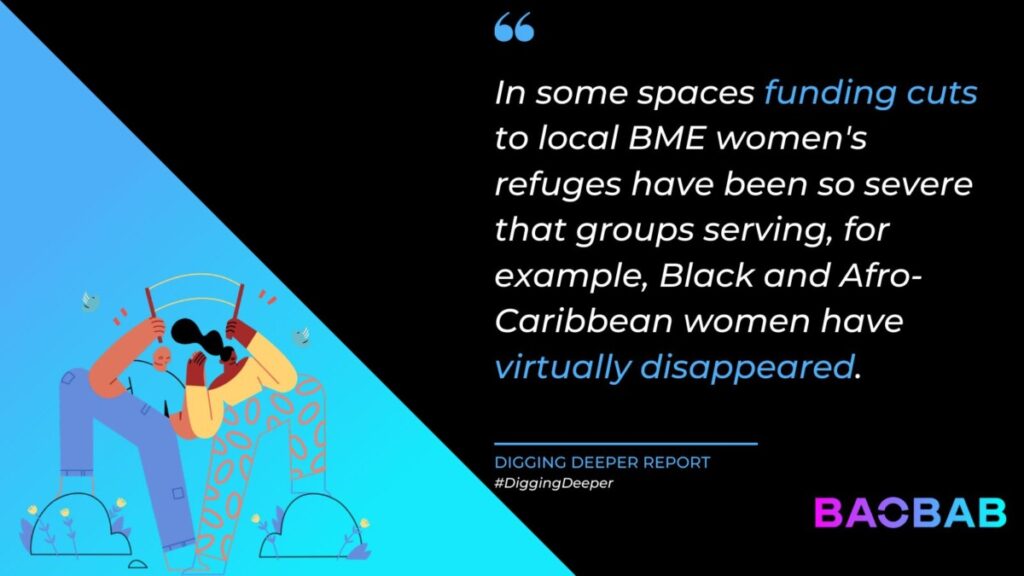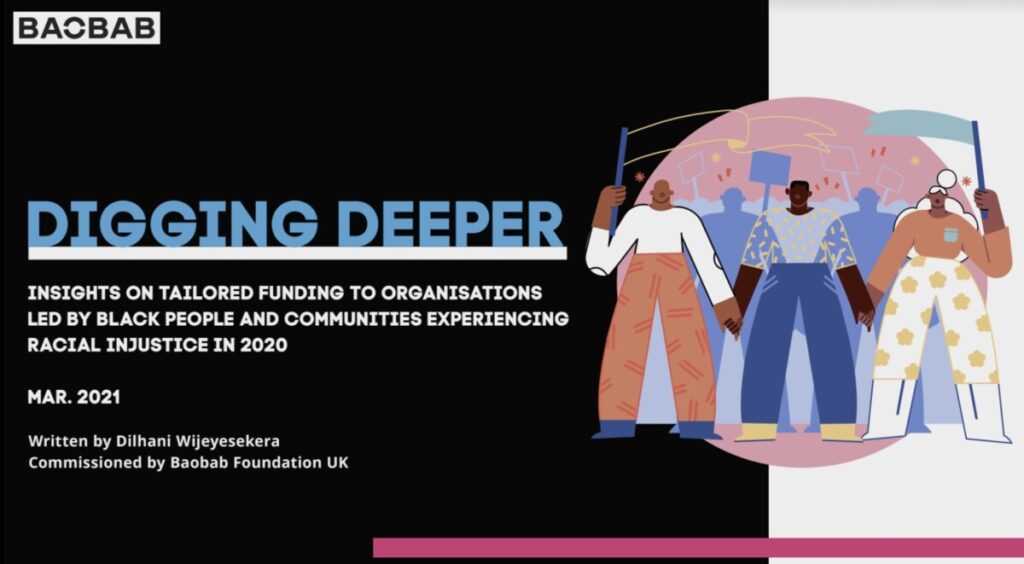Racial injustice and structural inequalities “still not addressed by funding”

Organisations led by Black and Ethnic Minority communities are still not receiving sufficient long-term and flexible funding to fight racial injustice in the UK, according to research by the Baobab Foundation.
Funding to Black and Ethnic Minorities in the UK has increased following the Covid-19 pandemic and Black Lives Matter protests. However, a report commissioned by the Baobab Foundation has found that “only a small proportion of funding… was long-term or focused on systemic issues such as racial injustice”. Consequently “many organisations remain in a precarious position as their funding is tied to Covid-19 activity”.
Digging deeper
“Digging Deeper: Insights on tailored funding to organisations led by Black people and communities experiencing racial injustice in 2020” is based on conversations with 26 respondents across 19 organisations that focus on funder insights and experiences of implementing tailored funding programmes for black people and communities experiencing racial injustice in the UK.
Advertisement
Despite new or refocused funding emerging in 2020 the Foundation’s report argues that it was small compared to the scale of need revealed during the year. For example, the Resourcing Racial Justice fund, one of the first open nationwide tailored funds launched during Covid-19, was able to support approximately 3% of the organisations seeking funding. While 1,400 applicants requested £33.5m, the fund made 51 awards totalling £1m).
The report confirms that “many organisations are dealing with historic under-investment“.

In addition it argues that “hyper-marginalised groups such as Black disabled people, Roma, gypsy and traveller people, women and trans people were under-represented and under-served by the funding made available, and continued to experience marginalisation within funding systems.” One respondent said:
“Black disabled people are often homogenised with the experience of white disabled people, as is often the case for Black and Ethnic Minority women” and women’s groups, in particular Black and Ethnic Minority women’s groups with insecure status, revealed they experienced greater hostility at a local level in accessing funds.
Baobab Foundation acknowledged that funders’ practices in delivering tailored programmes had improved but added that “more still needs to be done to ensure funders are not reproducing harm through burdensome processes beyond the pandemic.” Some respondents were concerned that BME-led organisations were not receiving fair treatment by fundraisers. One respondent asked:
“Is the tolerance for trial and error and taking on new roles as generous for BME led organisations as it is for white-led organisations?”
Overall, the Digging Deeper report claims that “people and communities impacted by racial injustice continue to have to navigate systems which they believe do not serve them.” It calls for funders to be “explicit about how they address racial injustice across their funding strategies.”
Indeed, one respondent highlighted the challenges in funding anti-racism efforts, saying “racial justice work is not always seen by funders as charitable”.

Call for large-scale, sustained and flexible funding
The Baobab Foundation is calling for funders to commit to providing large-scale, sustained and flexible funding to organisations led by and for Black people and communities experiencing racial injustice in the UK.
Jake Ferguson, Founder of Baobab and CEO of Hackney CVS said:
“Now more than ever we need to find ways to provide long-term support to Black communities experiencing racial injustice. Our ambition is to provide scaled and long-term commitment to investing in organisations led by and for Black and Ethnic Minority communities in the UK. We look forward to a brighter future and working with charitable and corporate funders to realise our ambition of a fairer society.”
Recommendations for funders
The report has five specific recommendations for funders:
- Deliver on large scale, sustained (5 years +) and flexible funding to organisations led by and for black people and communities experiencing racial injustice in the UK.
- Address the significant disparities in funding provision for groups outside London and those tackling intersectional oppression at multiple levels.
- Build strategic partnerships with organisations led by black people and communities experiencing racial injustice to tackle structural inequities across a range of social justice priorities.
- Adopt transformative policies and practices to address inequities in large-scale fund distribution and to take ethical investment portfolios to the next level, focusing on anti-racist investments.
- Improve cultural competency, representation and trauma-informed practices across funding to reduce harm, including fully acknowledge the leadership and labour of people bringing technical and lived expertise of racial injustice in the pursuit of this agenda in funders’ work.
The Baobab Foundation
The Baobab Foundation describes itself as “a new type of funding organisation; one that will support, grow and strengthen Black, Brown and minoritised ethnic communities and community organisations in the UK.”
It was “born out of anger, frustration and a desire for change following the death of George Floyd and Black Lives Matter demonstrations.”
The research report is designed to complement research by the Ubele initiative and by the Funders for Race Equality Alliance.
It is part of Baobab’s work “to understand how it can add value to the work of existing funders and what lessons we should apply as we develop our own thinking and influence funders to build on lessons learned so far”.
Baljit Banga, Executive Director at Black feminist organisation Imkaan and a member of the Baobab Foundation says:
“This is an extraordinary time that enables us to rethink and reimagine the funding landscape. We have an opportunity to address funding inequalities…
“We must centre our responses in a genuine and transformative intersectional framing which recognises how racism operates in our society and create pathways to resourcing equality. We have the tools to do this because Baobab is grounded in social justice. We ask the funding sector to hear our voices and to work with us to achieve the change we seek”.



